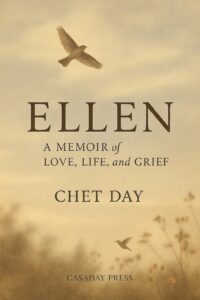So there I was last Tuesday morning, sitting at my kitchen table wolfing down bacon and eggs, watching the neighbor’s cat stalk a mockingbird, when it hit me: I hadn’t thought about deadlines, word counts, or monetization strategies in over an hour. I was just… daydreaming. Playing with words. Having fun with writing after retirement.
Funny how old age changes things.
For most of my writing life, underlying pressure was a regular companion: the need to produce, to publish, to profit. Don’t get me wrong, I loved the work. But there was always a voice in the back of my head asking, “Yeah, but can you sell this?” Retirement, though? Retirement whispers something different: “Who cares? Write it anyway.”
And that, my friends, is a liberating question.
Here’s something I’ve been pondering lately: Why write after we retire from the “real work” of our lives? I mean, if you’ve spent forty-some years in an office, a classroom, a hospital, or wherever you earned your keep, why pick up a pen (or keyboard) when you finally have the freedom to do absolutely nothing?

Turns out there are some pretty compelling reasons, and most of them have nothing to do with Amazon rankings or advances from publishers.
Your Brain Actually Gets a Workout
I know, I know—you’ve heard it a million times: “Use it or lose it.” But here’s the thing about writing that makes it different from, say, doing crossword puzzles or playing Wordle (though I’m babbling now, those are fine too). Writing engages your brain in a uniquely complex way.
When you write, you’re not just recalling information. You’re creating, organizing, revising, and expressing. Making connections between disparate memories and ideas. You’re translating the messy abstractions of your internal life into concrete words that someone else might actually understand. That’s serious mental heavy lifting, and your brain responds by forming new neural pathways and strengthening existing ones.
Recent research suggests that older adults who engage in creative hobbies like writing report being healthier, happier, and more satisfied with life. Not just a little bit happier, either; we’re talking measurably significant improvements in overall well-being.
There’s even a fancy term for what your brain is doing: neuroplasticity. Basically, your brain keeps adapting and evolving when you challenge it with new tasks. Writing memoir? You’re exercising memory recall. Crafting fiction? You’re flexing imagination and empathy muscles. Working on poetry? You’re playing with language in ways that keep your mind nimble.
And unlike going to an actual gym (which I should probably do more of), the writing gym is always open, never crowded, and you can show up in your pajamas.
The Stories Only You Can Tell
Speaking of memoir, let me share something I overheard the other day while standing in a long line at WalMart. An old guy was talking to what I took to be his grandson, telling stories about his childhood. I loved the one about the neighbor who claimed he’d seen Elvis at a Piggly Wiggly in 1982. Almost laughed aloud when the grandson asked, “What’s a Piggly Wiggly?”
I almost stuck my nose in their business to tell the old guy: “You should write those down.” I didn’t say anything but looking back on it now I probably should have.
Because that’s one of the most beautiful things about writing in retirement: you’ve accumulated decades of experiences, observations, and stories that will vanish like morning fog if you don’t capture them.
Psychologists have this concept called generativity, which is basically the human drive to leave something of value for future generations. Could be raising kids, planting trees, building businesses, or yes, writing down your stories. When you write about your life, you’re not being self-indulgent (despite what that critical voice in your head might say). You’re preserving family history, documenting a particular time and place, sharing hard-won wisdom.
Your grandkids might not care now about your stories from the Vietnam era or your memories of a world without smartphones. But trust me, someday they will. And when they do, wouldn’t it be something if those stories were waiting for them in your own words?
This reminds me of Laura Ingalls Wilder, who didn’t publish her first book until she was 65 years old. Sixty-five! She’d lived the experiences decades earlier, but it took all those years of reflection before she could transform them into the Little House books that generations of readers have treasured. Sometimes the best writing comes from letting experiences age like good bourbon.
Writing as Emotional Archaeology
Here’s something they don’t tell you about retirement: suddenly having plenty of time on your hands can be wonderful and terrifying in equal measure. Without the structure of work, without the identity that came with your career, you might find yourself asking some pretty big questions:
- Who am I now?
- What mattered in all those years?
- What do I actually think about things?
Writing is one of the most powerful tools I’ve found for finding meaningful answers to those questions.
I’m not talking about therapy, exactly (though I found writing wonderfully therapeutic to work my way through the horrible grief that stalked me after my wife of 47 years died on Thanksgiving Day of 2019). I’m talking about using writing to explore your interior landscape—your beliefs, your experiences, your disappointments and triumphs, the moments that shaped you. Journal writing, in particular, offers a private space to think on paper, to work through emotions, to make sense of life’s complexities.
Some mornings I sit at my computer with my coffee and just write whatever tumbles out. Stream of consciousness stuff. Complaints about my aging knees, gratitude for another sunrise, memories that bubble up unbidden, worries about the future, celebrations of small joys. Nobody will ever read it (probably), but that’s not the point. The point is the act itself, the translation of internal chaos into ordered sentences.
And you know what? On the mornings when I write like this, I feel clearer. Lighter. More present. The writing becomes a kind of meditation, a way of paying attention to my own life.
The Permission to Play
One of the unexpected gifts of writing in retirement is that you can finally give yourself permission to be terrible at it.
I spent years writing with a grinding sense of obligation—every word had to count, every sentence had to sing, every piece had to be publishable. Exhausting, frankly. But now? Now I can write absolute garbage and it doesn’t matter. I can experiment with forms I have no business attempting, and I can write a sonnet that would make Shakespeare weep (and not in a good way). I can start a novel and abandon it on page twelve. Shoot, I can write a rambling essay about mockingbirds and coffee that goes absolutely nowhere.
Because here’s the beautiful secret: not everything has to be good. Not everything has to be finished. Not everything has to be shared.
Writing can simply be play, the kind of purposeless, joyful exploration you probably haven’t allowed yourself since childhood. You can write science fiction even though you failed physics. And you can try your hand at mystery even though you’ve never investigated anything more complicated than where you left your reading glasses. You can write poetry that doesn’t rhyme, stories that don’t resolve, essays that meander like country roads.
The freedom to experiment without consequences, to create without criticism, to write for the pure pleasure of arranging words in interesting ways. That’s a luxury younger, career-focused writers rarely enjoy.
Finding Your People
One last thing I’ve discovered about writing in retirement: it connects you with other writers in ways that can be deeply satisfying.
Maybe you join a writing class at the local library or community college. Perhaps you find an online writing group for retirees. Or you could start attending open mic nights at the coffee shop downtown. Suddenly, you’re part of a community of people who understand why you care so much about whether “suddenly” is an overused word (it is, but I’m using it anyway) or debate the Oxford comma with the passion of sports fans arguing about playoff rankings.
These connections matter. Research shows that social engagement is crucial for healthy aging, and writing communities offer a particular kind of connection—built around shared creative struggle and mutual encouragement rather than just shared history or proximity.
Plus, there’s something wonderful about sitting around a table with other writers, reading your work aloud, receiving feedback, offering insights. It’s collaborative and supportive in ways that pure solitude can never be.
So if you’ve been thinking about writing in retirement but telling yourself you’re too old, too inexperienced, or too likely to fail… stop it. Those stories you’re telling yourself? They’re fiction, and not the good kind.
The truth is simpler: You have stories to tell, thoughts to explore, and decades of experience to draw from. You have the luxury of time, the freedom to experiment, and nothing to prove to anyone. Your brain will thank you, your grandchildren might treasure what you create, and you just might discover that writing offers something your career never could—the pure joy of creation without the burden of commerce.
Now if you’ll excuse me, that mockingbird is back, and I’ve got some thoughts about resilience and territory and the way morning light hits feathers that I need to capture before my fourth cup of coffee gets cold.
Write on, friends. Write on.
Hey, I’m 77 and I’ve Got Stories…
Stories about what it’s like to navigate life at this age (spoiler: it’s weird, wonderful, and occasionally terrifying). And stories about collaborating with AI to write books in ways that would have seemed like science fiction when I started putting words on paper. Stories about the daily realities, unexpected surprises, and hard-won wisdom that comes from three-quarters of a century on this planet. If you’re curious about authentic aging, writing innovation, or just enjoy good storytelling from someone who’s been around the block, subscribe to my weekly newsletter “Old Man Still Got Stories.” I promise to make it worth your time.
